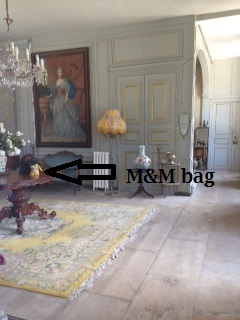Picture this: You and 15 of your closest friends in a château in the Champaign region of France for one week. This was lucky enough to be me just a few weeks ago, celebrating the 40th birthday of one of my dear friends. When I got the invitation, I will confess that I was excited for many reasons, one being the opportunity once again to experiment on my friends' eating habits for a whole week. Imagine me rubbing my hands together plotting!
Don't worry. My friends are perfectly aware that they are part of these experiments. Thankfully, they have learned to humor me (every now and then they even come up with experiment ideas). For example, there was the time I invited friends to a party and set up two different trays of chocolate chip cookies. One tray had bite-size cookies and the other had regular-size cookies of the same kind. I wanted to do a real life experiment to test out the research that people tend to make food decisions based on size perception. This one played out just like the experiment suggested it would: People ate more of the small version. It's likely due to the perception that they were eating fewer calories. However, they end up eating enough to equal the same or more calories than the regular size cookie. Was this experiment scientifically sound? Not really. Was it fun and extremely interesting? Definitely.
Let's get back to France. Let me tell you about this group. It was comprised of three physicians, eight people in various health care roles, four people in corporate sales and one person in marketing. Needless to say, this was a very well-educated and smart group of people. For the first time, I truly wondered if they would fall for this experiment or not. In France, you are surrounded by the most exquisite desserts and exceptional food. I love M&M's, but they pale drastically in comparison to French Cuisine.
The experiment: In a nutshell, this experiment was all about location, location, location. Would these "subjects" eat more M&M's based entirely on where the M&M's were located in the chateau?
The theory: This experiment was loosely based on a clever study led by Dr. Brian Wansink. In this study, his research team put Hershey Kisses in a visible location on a desk or across the room in a cabinet. The idea is that when candy is in arms reach, we tend to eat it -- because it is right there and convenient. They found that significantly more Hershey Kisses were eaten when they were visible and close by.
Design: It was simple, really. I placed a jumbo bag of M&M's in the direct flow of traffic. See the photo below. This table is next to the front door. I placed another jumbo-sized M&M bag in the kitchen down the hall.

Did they fall for it? Hook, line and sinker.
The results: When placed in the direct traffic path, this jumbo sized bag of M&M's disappeared in less than 45 minutes. In contrast, when the bag was stationed in the kitchen, the bag lasted three days. When the "subjects" passed the bag in the foyer, people stopped and mindlessly took a handful and went on their way. They ate them, just because they were there in their traffic path. When they intentionally had to go get them, they were not worth the effort -- and they all knew the M&M's were in the kitchen.
The lesson: Being smart doesn't protect you from being vulnerable to traps of mindless eating no matter where you are in the world.
The antidote: The antidote to mindless overeating and weight gain is a topic I cover extensively in my new book EatQ. It's written for the exact group of people that went on this trip -- smart, educated, busy, people who fall day after day for the tricky little situations that provoke us to mindlessly overeat -- like food being within arm's reach. EatQ talks about the deceptively-benign situations in daily life that trip up your eating and easy tricks to overcome them to lose weight and/or manage your weight (yes, really easy tricks!).
The EatQ Challenge: Play out this same experiment with yourself today. Don't let yourself fall for the location trap whether you are in France, your home, or your office.
Best wishes and Bon appétit!
Do you want to be my friend and be part of my sneaky food experiments too? I hope so! For now, we'll have to settle for being virtual friends. Click here to be my new "friend" (P.S. I'm offering free bonuses to friends who order EatQ before Sept. 25. Or stop feel free to stop by www.eatq.com to take a free EatQ quiz).
Dr. Susan Albers is a psychologist at the Cleveland Clinic and the author of six books on mindful eating. She has been quoted in the New York Times, Self, O Magazine, Shape, Fitness and on the Dr. Oz show. Learn more about Eat.Q: Unlock the Weight Loss Power of Emotional Intelligence on www.eatq.com.
For more by Dr. Susan Albers, click here.
For more on diet and nutrition, click here.